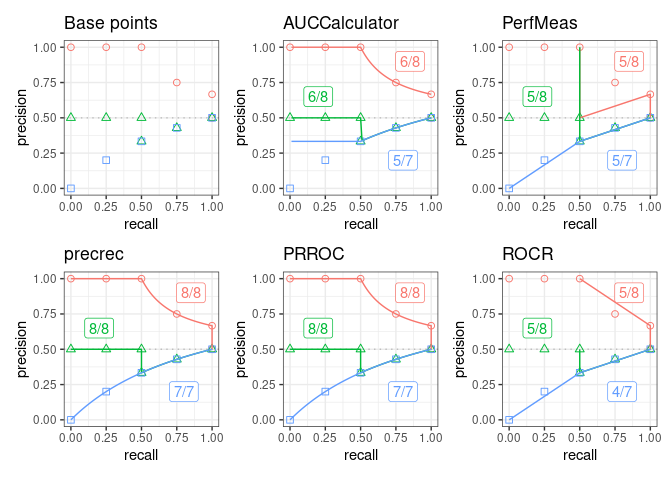
The hardware and bandwidth for this mirror is donated by dogado GmbH, the Webhosting and Full Service-Cloud Provider. Check out our Wordpress Tutorial.
If you wish to report a bug, or if you are interested in having us mirror your free-software or open-source project, please feel free to contact us at mirror[@]dogado.de.

The aim of the prcbench package is to provide a testing
workbench for evaluating precision-recall curves under various
conditions. It contains integrated interfaces for the following five
tools. It also contains predefined test data sets.
| Tool | Language | Link |
|---|---|---|
| precrec | R | Tool web site, CRAN |
| ROCR | R | Tool web site, CRAN |
| PRROC | R | CRAN |
| AUCCalculator | Java | Tool web site |
| PerfMeas | R | CRAN |
Disclaimer: prcbench was originally
develop to help our precrec library in
order to provide fast and accurate calculations of precision-recall
curves with extra functionality.
prcbench uses pre-defined test sets to help evaluate the
accuracy of precision-recall curves.
create_toolset: creates objects of different tools for
testing (5 different tools)create_testset: selects pre-defined data sets (c1, c2,
and c3)run_evalcurve: evaluates the selected tools on the
simulation dataautoplot: shows the results with ggplot2
and patchwork## Load library
library(prcbench)
## Plot base points and the result of 5 tools on pre-defined test sets (c1, c2, and c3)
toolset <- create_toolset(c("precrec", "ROCR", "AUCCalculator", "PerfMeas", "PRROC"))
testset <- create_testset("curve", c("c1", "c2", "c3"))
scores1 <- run_evalcurve(testset, toolset)
autoplot(scores1, ncol = 3, nrow = 2)
prcbench helps create simulation data to measure
computational times of creating precision-recall curves.
create_toolset: creates objects of different tools for
testingcreate_testset: creates simulation datarun_benchmark: evaluates the selected tools on the
simulation data## Load library
library(prcbench)
## Run benchmark for auc5 (5 tools) on b10 (balanced 5 positives and 5 negatives)
toolset <- create_toolset(set_names = "auc5")
testset <- create_testset("bench", "b10")
res <- run_benchmark(testset, toolset)
print(res)| testset | toolset | toolname | min | lq | mean | median | uq | max | neval |
|---|---|---|---|---|---|---|---|---|---|
| b10 | auc5 | AUCCalculator | 1.21 | 1.43 | 1.70 | 1.58 | 1.77 | 2.49 | 5 |
| b10 | auc5 | PerfMeas | 0.07 | 0.07 | 0.10 | 0.07 | 0.08 | 0.20 | 5 |
| b10 | auc5 | precrec | 4.47 | 4.52 | 4.73 | 4.75 | 4.87 | 5.04 | 5 |
| b10 | auc5 | PRROC | 0.17 | 0.18 | 0.23 | 0.18 | 0.19 | 0.44 | 5 |
| b10 | auc5 | ROCR | 1.81 | 1.81 | 1.89 | 1.82 | 1.84 | 2.16 | 5 |
Introduction
to prcbench – a package vignette that contains the descriptions of
the functions with several useful examples. View the vignette with
vignette("introduction", package = "prcbench") in
R.
Help
pages – all the functions including the S3 generics have their own
help pages with plenty of examples. View the main help page with
help(package = "prcbench") in R.
install.packages("prcbench")AUCCalculator requires a Java runtime environment (>=
6) if AUCCalculator needs to be evaluated.
You can install a development version of prcbench from
our GitHub
repository.
devtools::install_github("evalclass/prcbench")Make sure you have a working development environment.
Windows: Install Rtools (available on the CRAN website).
Mac: Install Xcode from the Mac App Store.
Linux: Install a compiler and various development libraries (details vary across different flavors of Linux).
Install devtools from CRAN with
install.packages("devtools").
Install prcbench from the GitHub repository with
devtools::install_github("evalclass/prcbench").
microbenchmark
does not work on some OSs. prcbench uses
system.time when microbenchmark is not
available.
sudo R CMD javareconfPrecrec: fast and accurate precision-recall and ROC curve calculations in R
Takaya Saito; Marc Rehmsmeier
Bioinformatics 2017; 33 (1): 145-147.
doi: 10.1093/bioinformatics/btw570
Classifier evaluation with imbalanced datasets – our web site that contains several pages with useful tips for performance evaluation on binary classifiers.
The Precision-Recall Plot Is More Informative than the ROC Plot When Evaluating Binary Classifiers on Imbalanced Datasets – our paper that summarized potential pitfalls of ROC plots with imbalanced datasets and advantages of using precision-recall plots instead.
These binaries (installable software) and packages are in development.
They may not be fully stable and should be used with caution. We make no claims about them.
Health stats visible at Monitor.